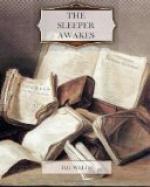Higher even than the most gigantic, wind-wheels hung this crow’s nest, a clear thousand feet above the roofs, a little disc-shaped speck on a spear of metallic filigree, cable stayed. To its summit Graham was drawn in a little wire-hung cradle. Halfway down the frail-seeming stem was a light gallery about which hung a cluster of tubes—minute they looked from above—rotating slowly on the ring of its outer rail. These were the specula, en rapport with the wind-vane keeper’s mirrors, in one of which Ostrog had shown him the coming of his rule. His Japanese attendant ascended before him and they spent nearly an hour asking and answering questions.
It was a day full of the promise and quality of spring. The touch of the wind warmed. The sky was an intense blue and the vast expanse of London shone dazzling under the morning sun. The air was clear of smoke and haze, sweet as the air of a mountain glen.
Save for the irregular oval of ruins about the House of the Council and the black flag of the surrender that fluttered there, the mighty city seen from above showed few signs of the swift revolution that had, to his imagination, in one night and one day, changed the destinies of the world. A multitude of people still swarmed over these ruins, and the huge openwork stagings in the distance from which started in times of peace the service of aeroplanes to the various great cities of Europe and America, were also black with the victors. Across a narrow way of planking raised on trestles that crossed the ruins a crowd of workmen were busy restoring the connection between the cables and wires of the Council House and the rest of the city, preparatory to the transfer thither of Ostrog’s headquarters from the Wind-Vane buildings.
For the rest the luminous expanse was undisturbed. So vast was its serenity in comparison with the areas of disturbance, that presently Graham, looking beyond them, could almost forget the thousands of men lying out of sight in the artificial glare within the quasi-subterranean labyrinth, dead or dying of the overnight wounds, forget the improvised wards with the hosts of surgeons, nurses, and bearers feverishly busy, forget, indeed, all the wonder, consternation and novelty under the electric lights. Down there in the hidden ways of the anthill he knew that the revolution triumphed, that black everywhere carried the day, black favours, black banners, black festoons across the streets. And out here, under the fresh sunlight, beyond the crater of the fight, as if nothing had happened to the earth, the forest of wind vanes that had grown from one or two while the Council had ruled, roared peacefully upon their incessant duty.




